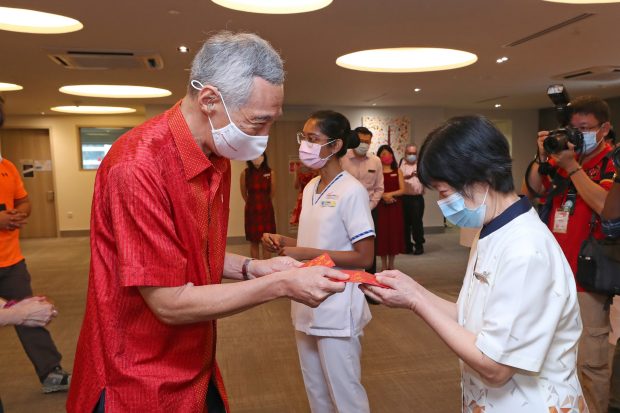Singapore adds gumption, funds for post-Covid-19 rebound

Prime Minister Mr Lee Hsien Loong thanking Singaporeair Cabin Crew Centre teams to thank them for keeping Singapore going every day (Twitter).
By Ivan Lim
Former AJA President, Contributor to AsiaN
SINGAPORE: Singapore, successful in taming the invidious Coronavirus to single-digit outbreaks, is poised for a confident rebound in the post-Covid-19 era.
In a December 31 New Year message, a triumphant Prime Minister, Mr Lee Hsien Loong, declared “seeing light at the end of the tunnel”.
On February 16, the government unveiled an “Emerging Stronger Together Budget” as the city-state went ahead relaxing restrictions on movements and businesses under its Phase 3 re-opening.
The new three-year Budget has both short- and long-term goals.
For the immediate future, a S$11 billion Covid-19 Resilience Package designed to safeguard the health of Singaporeans, involving $4.6 billion for vaccination, contact-tracing, testing and isolation facilities.
The screening and quarantine measures are calculated risks for foreigners to enter the republic even as tourist numbers have plummeted by 40 per cent owing to Covid-19.
The authorities are also mulling having “reciprocal green lanes” at Changi Airport for tourists coming from countries that have brought the pandemic under control. Such visitors will be exempted from having to serve quarantine time on arrival.
For the long haul, a $24 billion Emerge Stronger allocation was made to nurture a vibrant business community of innovation and enterprise that is linked to Asean and the world.
As the pandemic has turned people towards online shopping and other services, the funding will give a push to small and medium enterprises to upgrade and digitalize their operations.
Looking further ahead towards environmentally friendly and sustainable living, the government also fleshed out an ambitious Singapore Green Plan 2030. One of its key initiatives is anew $60million Agri-Food Cluster Transformation Fund, which forms part of efforts to ensure adequate food for the island-state’s 5.8 million population.
A blue-sky initiative is to phase out diesel and petrol cars, replacing them with electric vehicles. Under the Green Plan $30 million will be allocated over five years for installing 60,000 charging points at car parks by 2030.
Added to this is a carbon tax of $5 per ton aimed at reducing carbon emissions.
The impact and challenges of Covid-19 will also be taken up in Singapore by an international gathering of top political and business and industry leaders when the city-state hosts the World Economic Forum (WEF) special annual meeting (August 17-20).
Ahead of this high-profile meeting of up to 3,000 participants, complete with a virtual segment, the Singapore Tourism Board has been piloting Mice (meetings, incentives, conference and exhibition) events under a Safe Business Events framework. Organizers have to ensure that measures are in place to prevent infections before, during and after the events.
As a kind of rehearsal for the upcoming WEF pow-wow, in November last year, the Travel Revive meeting in Singapore attracted 1,000 physical local and international participants.
In January, the United States Professional Convention Management Association convention took place at the Marina Bay Sands conference centre – the first time it was held outside North America.
The gathering of 3,000 online participants and 300 attendees featured prominent speakers, including former Australian Prime Minister Julia Gillard.
The importance placed on reviving the Mice sector can be gauged from these figures: it supports 34,000 employees and it churned out $3.8 billion revenue or one percent of Singapore’s GDP.
Beyond the Novel Coronavirus menace, that followed the SARS (Severe Acute Respiratory Syndrome) outbreak in 2003-04, Singapore is preparing for any possible next big super-bug.
The Defence Ministry and the Health Ministry are working together to upgrade the state’s biosafety laboratories so they could deal with more deadly viruses. The $90 million project will scale up the capabilities of the national defence research agency (DSO) National Laboratories to Biosafety L-4, the highest level of safety precautions globally.
Scientists working in the special BSL-4 labs will be able “to isolate and culture new infectious disease pathogens or known high-risk pathogens to develop diagnostics and solutions against new super-bugs
As a Brave New Post-Covide-19 World beckons, the small but scout-like Singapore is putting in not just money and physical resources but also plenty of gumption to ‘Be Prepared’.





















































